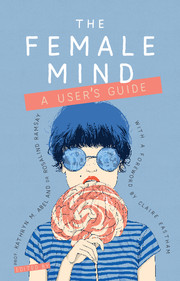Book contents
- Frontmatter
- Acknowledgements
- Contents
- Foreword
- Introduction: being female
- Part I Women in perspective
- Part II Women and society
- Part III Women and their environment
- 10 Emotional well-being and staying well
- 11 Sensitive motherhood
- 12 Religion and spirituality
- 13 Linking physical and mental health in women
- 14 Obesity
- 15 Women and sleep
- 16 Women and pain
- 17 Bereavement, loss and grief
- Part IV Women and specific disorders
- Part V Women and treatment
- Contributors
- Index
14 - Obesity
from Part III - Women and their environment
Published online by Cambridge University Press: 02 January 2018
- Frontmatter
- Acknowledgements
- Contents
- Foreword
- Introduction: being female
- Part I Women in perspective
- Part II Women and society
- Part III Women and their environment
- 10 Emotional well-being and staying well
- 11 Sensitive motherhood
- 12 Religion and spirituality
- 13 Linking physical and mental health in women
- 14 Obesity
- 15 Women and sleep
- 16 Women and pain
- 17 Bereavement, loss and grief
- Part IV Women and specific disorders
- Part V Women and treatment
- Contributors
- Index
Summary
In ancient times, the human brain adapted to manage hunger. Women in particular became exquisitely attuned to cycles of feast and famine, with fertility switched on by feast and switched off by famine. Food became a reward, an antidepressant and a comfort. Female beauty and female health became entwined in cultural ideals.
Now, many of us live in an urban jungle. We move less and eat more. Even in the developing world, obesity is outstripping underweight. Hunger drives our behaviour more strongly than satiety, and a powerful food industry encourages greater consumption of saturated fats and dairy products than ever before. No wonder we face an obesity epidemic.
But weight is more complex than that. Only a quarter of schoolgirls are actually overweight, but two-thirds believe they are. Body image disparagement is widespread and girls face counterproductive social pressures to lose weight and reshape their bodies. The female beauty ideal is divorced from female health, leaving many women and girls at war with their bodies. So there is more to tackling obesity than simply moving more and eating less.
For many overweight women, psychological factors are as relevant as they are for women with anorexia or bulimia nervosa. Research has shown that ‘pleasure centres’ in the brain light up with the mere thought of food, and food can be as addictive as alcohol and cigarettes. But whereas women with alcohol problems can avoid going to pubs and bars, and drug addicts can hide their illness from prying eyes, for the obese, there is no avoiding food. The stigma is always visible. Overweight women are demonised and society equates female restraint with moral virtue.
Countering obesity
So what is to be done? There is no one-size-fits-all solution. Society has tackled smoking and alcohol misuse through public health policies on advertising and taxation. But the food industry is a powerful lobby group.
We need to promote positive, diverse body image and healthy living in schools, turning away from an excessive focus on weight and guiding children to strong self-esteem through healthy behaviours. Prevention is better than cure, and our children are harmed by scare stories about obesity that trigger unsustainable, counterproductive diets.
- Type
- Chapter
- Information
- The Female MindUser's Guide, pp. 88 - 90Publisher: Royal College of PsychiatristsPrint publication year: 2017



